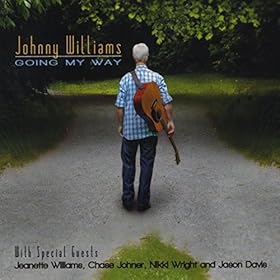|
Lonesome River Band, Turn on a Dime (Mountain Home, 2014) Johnny Williams, Going My Way (Mountain Roads, 2014) Among the most successful bluegrass groups of recent decades, the Lonesome River Band offers up its first new album in more than four years. Under the collective title Chronology its three previous releases, on Rural Rhythm, consisted of freshly arranged versions by the current lineup of favorites from LRB's earlier years. I reviewed each in this space in 2012.
Since I have to say something, though, let me assure doubters -- that is, newcomers -- that the material is uniformly strong. Aside from three Rickman co-writes it comes from outside the band. A particularly felicitous choice is Merle Haggard's "Shelly's Winter Love," stretched to 5:12 in a kind of bluegrass-orchestral arrangement and affectingly sung by Jones. Adam Wright's "Bonnie Brown," which has the ambience of an old Appalachian song, is 'grass at its most elemental and downhome. Shelor re-imagines the venerable folk tune "Cumberland Gap," the closer, so radically that I'm not sure I'd have recognized it without guidance from the song list. If LRB mixes up-to-date and historic ways of performing bluegrass, guitarist Johnny Williams serves the pure tradition as a carrier of the foundational ideas of mountain bluegrass. Going My Way goes the way, in short, of the music's first generation. Not the Stanley Brothers exactly, but within singing and picking distance. Williams, not a young man, has been at this all his life, and it shows, combining professionalism and soulfulness in this always compelling album.
That's exactly what's going on here, exemplified in Darrell McCall/Lamar Morris's "Eleven Roses," a splendidly morose country song that, rather incredibly to me, was Hank Williams Jr.'s first hit in 1972; I am not a Hank Jr. fan, which may be why I don't recall hearing this before. Something about roses in country and bluegrass brings out the most emotionally raw and unforgettable, which is why it's perfectly suited to the Williams with whom we are here concerned. He inhabits the spirit of the devastated narrator, and he'll put you on the floor as surely as the late George Jones did with another heart-ripping rose song, the immortal "A Good Year for the Roses." And then there's another entry in the floral category, "The Prettiest Flowers," written by the celebrated hillbilly gospel composer Albert Brumley, who as far as I know never wrote anything less than first rate; you may remember him from such classics as "Rank Strangers" and "This World is Not My Home." Suffice it to say Williams knows how to deliver a sacred number. Among his other talents a fine songwriter, Williams wrote half of the dozen tracks. On his "Ease My Worried Mind" he sings a lovely harmony duet with Nikki Wright, who also plays fiddle on the album. As both song and vocal it recalls something the Everly Brothers could have done in their prime. Where Williams goes, gems follow. 
|
 Rambles.NET music review by Jerome Clark 14 February 2015 Agree? Disagree? Send us your opinions!  Click on a cover image to make a selection. 



 |


